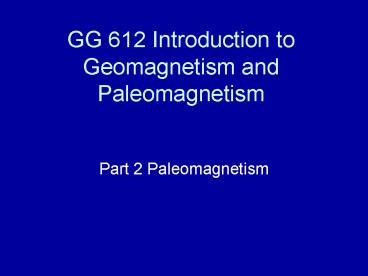GG 612 Introduction to Geomagnetism and Paleomagnetism - PowerPoint PPT Presentation
1 / 43
Title: GG 612 Introduction to Geomagnetism and Paleomagnetism
1
GG 612 Introduction to Geomagnetism and
Paleomagnetism
- Part 2 Paleomagnetism
2
Paleomagnetism
Methods
Records of the geomagnetic field
Observations Paleosecular variation Reversals
Application Stratigraphy Geomagnetic time
scale High resolution PSV scales
Comparisons of VGPs from different
regions Tectonics
( Many figures from Rob Butler Paleomagnetism on
web)
3
Paleomagnetic survey
Collection and orientation of samples
4
Measurement of samples
Astatic magnetometer
5
Spinner magnetometer
Rotation of rock sample. Gives in coils
perpendicular to the axis of rotation an EMF
whose phase and strength is dependent upon
the direction and intensity of magnetization of
the sample.
6
SQUID MAGNETOMETER
7
Thermal demagnetization
Signal and noise separation by T thermal
demagnetization
Equipment
8
AF demagnetization
Signal and noise separation by AF demagnetization
9
Display of demagnetization data
3D visualization
Standard 2D Representation Also Illustrating Resul
ts of Principal Component analysis
10
Display of Paleomagnetic data
Can be used for directions or VGPs
11
Presentation directions and VGPs
12
Fisher statistics
13
Corrections - initial orientation to geographic
to stratigraphic
Always done by rotation matrices in computer
14
Field tests of stability of NRM
(1) Conglomerate test (/ve)
(3) Grahams fold test (ve)
(2) Baked contact test (/ve)
15
Conglomerate test.
16
Baked contact test.
17
Paleomagnetism results.
Studies of secular variation gave detailed
results for field variation over periods of
thousands of years
First major surprise field reversals - discovered
100 years ago - but major debate before
acceptance. What happens during reversals? When
do they occur? The Geomagnetic polarity scale.
18
Reversals
Collections in Hawaii - Oahu revealed about half
declinations were to the north and half to south.
(Cox and Doell 1969)
19
Reversal stratigraphy.
20
Records from Ocean Sediments
Opdyke et al., 1968
21
Intensity decrease before directional changes.
Record from Intrusion.
Dodson et al., 1978
22
Enhanced PSV recorded in Tatoosh Intrusion Records
Loop observed over 2m in reversal record.
Probably equivalent to a few hundred years
23
Planetary wide aspects of transitional fields
(a) Virtual geomagnetic pole analysis
1. Dipole test - Hillhouse and Cox,
1976 2. Zonal model - Hoffman, 1977. 3 Preferred
paths - Clement, 1991, Tric et al., 1991, Laj et
al. 1991.
24
Are there Preferred VGP Paths?
Clement , 1991
25
Preferred VGP paths
- Preferred paths appear to correlate with features
in present field, in core and deep mantle. - Radial field at CMB
- Flow at top of Core
- P-wave velocity at 2300kms.
Laj et al., (1991)
26
TRANSITION FIELD ANALYSIS
Field ModelTermination of Olduvai(N-R)
Mazaud, 1995
27
Brunhes-Matuyama (Br)
Shaos analysis JGR. (1999)
28
Brunhes-Matuyama (Br2)
Early stage Middle stage Late stage
Dominance of radial field along preferred VGP
paths.
29
Reversal Transition fields
Brunhes Matuyama R-N
Onset of Jaramillo R-N
Termination of Olduvai N-R
30
REVERSALS
Dynamo equations permit reversals and simulations
of dynamos by numerical models give spontaneous
reversals. The suns dynamo reverses, so that
the sunspot 11 year cycle is really a 22-year
reversal cycle. Appears to be an inevitable
occurrence in dynamos
31
MEANWHILE Paleomagnetism had made considerable
progress on the old somewhat discredited theory
of continental drift.
32
Paleomagnetism and Tectonics
33
Continental drift
Apparent Polar Wander Paths (APW paths)
Present coordinates
Paleogeographic coordinates
34
Reconstruction with rotations about Euler poles
35
N.America-Europe reconstruction
36
Regional tectonics applications
Directions are found to be discordant with
VGP for landmass
37
Rotations observed
Kamerling and Luyendyk 1979
38
Modelsfor localtectonic deformation
39
Sea floor anomalies
Geophysical puzzle of century. Magnetic
anomalies discovered by Mason Raff and
Vacquier. Vine Matthews key To
solution Remanence not induced
40
Seafloor anomalies
41
Seafloor Anomalies 2
42
Seafloor as a giant tape recorder
43
The Giant Extrapolation































